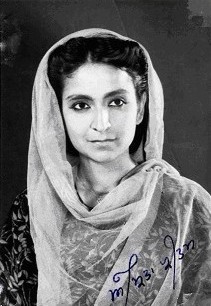
Back Amrita Pritam Afrikaans أمريتا برايتام Arabic امريتا برايتام ARZ অমৃতা প্ৰীতম Assamese آمریتا پریتام AZB Amrita Pritam BCL Амрита Притам Bulgarian अमृता प्रीतम Bihari অমৃতা প্রীতম Bengali/Bangla Amrita Pritam Breton
Amrita Pritam | |
|---|---|
 Pritam c. 1948 | |
| Born | Amrit Kaur 31 August 1919 Gujranwala, Punjab Province, British India (now Punjab, Pakistan) |
| Died | 31 October 2005 (aged 86) Delhi, India |
| Occupation | Novelist, poet, essayist |
| Nationality | Indian |
| Period | 1936–2005 |
| Genre | poetry, prose, autobiography |
| Subject | Partition of India, Women, Dream |
| Literary movement | Romantic-Progressivism |
| Notable works | Pinjar (novel) Ajj aakhaan Waris Shah nu (poem) Suneray (poem) |
| Notable awards | Sahitya Akademi Award (1956) Padma Shri (1969) Bharatiya Jnanpith (1981) Shatabdi Samman (2000) Padma Vibhushan (2004) |
| Spouse | Pritam Singh |
| Partner | Imroz |
| Children | 2 |
| Member of Parliament, Rajya Sabha | |
| In office 12 May 1986 – 11 May 1992 | |
| Constituency | Nominated |
Amrita Pritam ([əm.mɾɪt̪ɑː pɾiːt̪əm] ; 31 August 1919 – 31 October 2005) was an Indian novelist, essayist and poet, who wrote in Punjabi and Hindi.[1] A prominent figure in Punjabi literature, she is the recipient of the 1956 Sahitya Akademi Award. Her body of work comprised over 100 books of poetry, fiction, biographies, essays, a collection of Punjabi folk songs and an autobiography that were all translated into several Indian and foreign languages.[2][3]
Pritam is best remembered for her poignant poem, Ajj aakhaan Waris Shah nu (Today I invoke Waris Shah – "Ode to Waris Shah"), an elegy to the 18th-century Punjabi poet, and an expression of her anguish over massacres during the partition of British India. As a novelist, her most noted work was Pinjar ("The Skeleton", 1950), in which she created her memorable character, Puro, an epitome of violence against women, loss of humanity and ultimate surrender to existential fate; the novel was made into an award-winning film, Pinjar (2003).[4][5]
When British India was partitioned into the independent states of India and Pakistan in 1947, she migrated from Lahore to India, though she remained equally popular in Pakistan throughout her life, as compared to her contemporaries like Mohan Singh and Shiv Kumar Batalvi.
Pritam's magnum opus, the long poem Sunehade, won her the 1956 Sahitya Akademi Award, making her the first and the only woman to have been given the award for a work in Punjabi.[6] She received the Jnanpith Award, one of India's highest literary awards, in 1982 for Kagaz Te Canvas ("The Paper and the Canvas"). She was awarded the Padma Shri in 1969, and the Padma Vibhushan, India's second highest civilian award, in 2004. In that same year she was honoured with India's highest literary award given by the Sahitya Akademi (India's Academy of Letters), the Sahitya Akademi Fellowship, awarded to the "immortals of literature" for lifetime achievement.[7]
- ^ Cite error: The named reference
langwas invoked but never defined (see the help page). - ^ Cite error: The named reference
guarwas invoked but never defined (see the help page). - ^ Amrita Pritam: A great wordsmith in Punjab’s literary history Archived 19 June 2006 at the Wayback Machine Daily Times (Pakistan), 14 November 2005.
- ^ Always Amrita, Always Pritam Gulzar Singh Sandhu on the Grand Dame of Punjabi letters, The Tribune, 5 November 2005.
- ^ Pinjar at IMDb
- ^ Amrita Pritam Modern Indian Literature: an Anthology, by K. M. George, Sahitya Akademi. 1992, ISBN 81-7201-324-8.945–947.
- ^ Sahitya Akademi fellowship for Amrita Pritam, Anantha Murthy The Hindu, 5 October 2004.